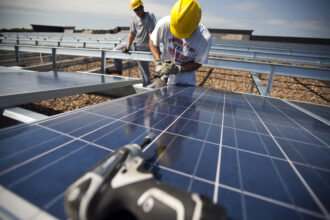Gulf Spill Is the Largest of Its Kind, Scientists Say (New York Times)
The BP spill is by far the world’s largest accidental release of oil into marine waters, according to the most precise estimates yet of the well’s flow rate, announced by federal scientists on Monday.
BP Aims to "Kill" Well as Early as Tuesday (Reuters)
BP was still hoping to attempt the first of two operations to permanently plug its ruptured Gulf of Mexico well on Tuesday despite the technical delay of a crucial test.
Groups Seek Judge’s Removal from Drilling Case (AP)
Several environmental groups have asked a federal appeals court to disqualify a judge from a lawsuit over the Obama administration’s initial six-month moratorium on deepwater oil drilling.
BP Faces Insider Dealing Probe as Nears Well Kill (Reuters)
BP faces an investigation into whether its employees profited illegally from the Gulf spill, as the oil giant prepared on Tuesday to kill the blown-out well for good.
Citing Tests, E.P.A. Says It Was Wise to Use Oil Dispersant (Green)
The EPA said on Monday that the toxicity of the mix of oil and dispersant sprayed to combat the gulf oil spill was generally in the range of moderate, comparable to the effects of the oil.
Gulf of Mexico "Dead Zone" Overlaps BP Spill Zone (Reuters)
This year’s low-oxygen "dead zone" in the Gulf of Mexico is one of the largest ever, about the size of Massachusetts, and overlaps areas hit by oil from BP’s broken Macondo well, Louisiana scientists reported.
Enviro Group Sues EPA Over Greenhouse Gas ‘Tailoring’ Rule (Greenwire)
Environmentalists are suing the EPA over a rule that aims to regulate greenhouse gases from only the largest industrial sources, arguing that the agency exempts too many big polluters.
U.S. Senate Republican Leader Sees Energy Bill Defeat (Reuters)
Senate Minority Leader Mitch McConnell said on Monday he expects a wall of Republican opposition this week to a Democratic energy bill, which could doom hopes for quick passage of a measure that aims to clean up offshore drilling practices.
Law Center Prepares Lawsuit Over Mich. Oil Spill (AP)
A public interest law firm prepared Monday to sue the owners of a pipeline that ruptured in southern Michigan and dumped hundreds of thousands of gallons of oil into a Kalamazoo River tributary.
Feds Approve Expansion of Wyoming Coal Mine (AP)
The Bridger Coal mine in southwestern Wyoming is expanding its operations to approximately another 2,000 acres. The expansion was approved last week by the U.S. Bureau of Land Management.
Global Warming to Exceed 1.5°C, Finds Report (Financial Times)
The world is likely to warm by an average of more than 1.5°C above pre-industrial levels, according to a new report from the three major climate research centers that was published to coincide with the current UN climate talks in Bonn.
U.S. Says It’s Committed to Cutting Greenhouse Gases (AP)
The U.S. assured international negotiators on Monday in Bonn that it remains committed to reducing carbon emissions over the next 10 years, despite the collapse of efforts to legislate a climate bill.
‘Clear Proof’ Is Needed $30 Billion in Climate Aid Was Disbursed, UN Says (Bloomberg)
Developed countries must give "clear proof" they’ve started disbursing $30 billion of climate aid that they pledged last year to poorer nations, the new UN climate chief said.
Australia Agriculture Faces Climate Upheaval: Scientist (Reuters)
Land available for agriculture in Australia, one of the world’s largest food exporters, is in danger of shrinking because of climate change, a leading scientist said on Tuesday.
World Bank: Biofuels Didn’t Cause Grain Price Booms (Renewable Energy World)
A new white paper from the World Bank’s Development Prospects Group concludes that biofuels were not the main reason for the spike in grain prices from 2006 to 2008.
New Solar Energy Conversion Process Could Double Solar Efficiency of Solar Cells (Science Daily)
A new process that simultaneously combines the light and heat of solar radiation to generate electricity could offer more than double the efficiency of existing solar cell technology, say the Stanford engineers who discovered it and proved that it works.
About This Story
Perhaps you noticed: This story, like all the news we publish, is free to read. That’s because Inside Climate News is a 501c3 nonprofit organization. We do not charge a subscription fee, lock our news behind a paywall, or clutter our website with ads. We make our news on climate and the environment freely available to you and anyone who wants it.
That’s not all. We also share our news for free with scores of other media organizations around the country. Many of them can’t afford to do environmental journalism of their own. We’ve built bureaus from coast to coast to report local stories, collaborate with local newsrooms and co-publish articles so that this vital work is shared as widely as possible.
Two of us launched ICN in 2007. Six years later we earned a Pulitzer Prize for National Reporting, and now we run the oldest and largest dedicated climate newsroom in the nation. We tell the story in all its complexity. We hold polluters accountable. We expose environmental injustice. We debunk misinformation. We scrutinize solutions and inspire action.
Donations from readers like you fund every aspect of what we do. If you don’t already, will you support our ongoing work, our reporting on the biggest crisis facing our planet, and help us reach even more readers in more places?
Please take a moment to make a tax-deductible donation. Every one of them makes a difference.
Thank you,











